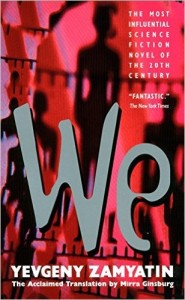In Zamyatin’s bizarre and ingeniously sobering novel of “We”, ((Zamyatin, Yevgeny. We. New York: Modern Library, 2006.)) rationality triumphs emotion as mathematics reigns as the supreme dogma of the individual’s life and mind. Of course, in this case, the term “individual” refers to the collective mass of workers known as ciphers who exist as mere figures in the long string of omnipotent code that is the dull and gray One State. Freedom is condemned as an uncouth crime while whimsical dreams and fits of inspiration are cruelly filed under the category of epileptic anomaly. The hero, and eventual martyr, of the story is D-503, a thirty-two-year-old cipher who is in charge of building the Integral, a marvelous product of modern science and technology purposefully constructed in order to integrate extraterrestrial societies into the blissful monotony of the One State. D-503 venerates mathematics and the exquisitely logical “Table” that dictates every hour of his daily life apart from his sexual, and even that is governed by the rules of “Paternal & Maternal Norms” and pink tickets. His life changes drastically as he is violently birthed into a world of vibrant color and independent thought propagated by a female cipher, I-330, who quite literally grasps him by his shaggy, primitive-like hands and pulls him out.
New, revolutionary ideologies spread within D-503 like a cancer, resulting in the proliferation of disinformation and disaggregation that are so dreadfully toxic to the prosperity of the One State. The cast-iron hands that of the Benefactor that seem to preside over all are defied, rejecting one of the core principles of the later Russian Revolution; the worship of industry and enthrallment of efficiency, as seen through the famed ideas of Taylor the economist that are so imbued within the novel. Zamyatin sees the dark side of the revolution, and generates an unsettling world that causes one to fear philosophies such as that of the poet Kirillov in his work The Iron Messiah. ((Kirillov, Iron Messiah)) The novel continuously examines the effects of antireligion, in which old, conservative traditions are ironically replaced with new progressive ideals embodied in the exaltation of mathematics and machinery. Through the terror of the guardians and vice-like grip of Communism, the people are forced to march along with eyes lowered and minds shut. Nonetheless, the subjugation by the One State of its people is not infinite; as per the existence of the irrational root of negative 1, there will always exist a number that rational governance is unable to enslave.

